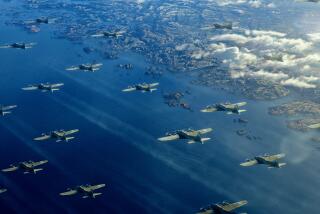Bomber Harris by Dudley Saward (Doubleday: $19.95; 333 pp., llustrated)
- Share via
At the height and heat of war, with Germany burning from Duesseldorf to Berlin, Air Chief Marshal Sir Arthur Harris was revered. Churchill and Eisenhower spoke and wrote of their intense admiration of his heroic command. To British citizens amid their rubble, he was an awesome and applauded revenge for the Luftwaffe’s devastation of Coventry, Birmingham and London.
Then the fires died. Harris was excluded from a Victory Honours List that elevated fellow RAF leaders to the peerage. A prime minister canceled his selection as governor of Bermuda. In a wave of remorse common to postwar periods, Harris was attacked by pacifists within Britain’s post-war Labour government. Writers later denigrated his bombing victories as costly failures and as callous slaughter of civilians.
Harris swallowed the humiliation. He retired in silence. In 1971, Harris did meet with author Dudley Saward, a former RAF group captain who served beneath him in Bomber Command. A biography was authorized but, said Harris, it must not be published until after his death.
Harris, age 92, died last year.
Now, through Saward, he talks--unfortunately in a book that fails to produce any substantial motive for the defusing of Bomber Harris.
It’s hard to accept that the personal spite of John Strachey--an RAF squadron leader once fired by Harris as a security risk--could have canceled out the clout of Churchill, Eisenhower and King George VI. Even if Strachey did become under-secretary of state for air, a lofty title for a somewhat lightweight position, in the immediate postwar government.
Favors were doubtless found and lost with the dissolution of Churchill’s wartime coalition government and the 1945 election of Prime Minister Clement Atlee’s peacetime Labour administration. Yet, one must presume that elements within the Atlee government had higher priorities in brutally damaged Britain than the covert crucifixion of one RAF staff officer. And if salving the public conscience were a viable reason, why was Harris the chosen scapegoat?
Harris was indeed a total and controversial advocate of saturation bombing--the blitzing of both military and civilian targets to stagger Germany’s war effort and morale. So his dethroning, in the light of peace and retroactive judgments, may be no more than that: an act of national penance.
“It is doubtful whether one will ever know the true reasons for the gross ingratitude . . . to Harris and his ‘Bomber Boys’ for their immense contribution to victory,” admits Saward.
The absence of a juicy expose, however, is only slight damage to this clean profile of Harris, his profession and ascent as an officer who often spoke against command decisions (even suggesting an alternative to the D-Day invasion: the saturation, one-a-day bombing of major centers) yet always executed them with maximum efficiency.
Harris was the father of night bombing, the four-engined heavy bomber and of pathfinding techniques. He was one of the few to question the importance of hammering Schweinfurt in the belief (later proven) that Germany’s ball-bearing production had been moved elsewhere.
Wrote Eisenhower to Harris: “Your professional skill and selfless dedication to the cause in which we all served will be noted by the histories of those dramatic months. . . .”
Wrote Churchill to Harris: “I believe that the massive achievements of Bomber Command will long be remembered as an example of duty nobly done.”
Neither came to pass.
More to Read
Sign up for Essential California
The most important California stories and recommendations in your inbox every morning.
You may occasionally receive promotional content from the Los Angeles Times.












